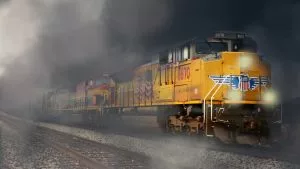
Just weeks after America witnessed a black plume of toxic murk billowing above East Palestine, the Surface Transportation Board inexplicably decided to increase the chance of an identical derailment horror, right here in the Chicago area.
When the Board approved America’s first big railroad merger in 25 years, it ensured that there will be a 300-600% increase in freight train traffic each day in our communities. That means 11,000 more rail cars filled with toxic chemicals will lumber down the tracks through Chicago and its surrounding suburbs each year. We don’t know what those chemicals will be—carcinogenic? combustible? explosive?—and the towns along the rail lines that will be forced to respond to any derailment won’t know, either.
Board Chairman Martin Olberman defended his approval of this grotesquely-timed merger with vague assurances that transportation of dangerous chemicals by rail is safer than by truck.
But Olberman couldn’t possibly know that. He hasn’t considered what freight train operations do that most frequently endangers public safety, let alone how his merger badly compounds the danger.
Even when it’s not involved in a headline-grabbing derailment, every freight train is a pollution factory. It belches diesel exhaust everywhere it goes, especially when the train is left idling for lengthy periods of time, which is a common occurrence. Diesel exhaust is classified by The International Agency for Research on Cancer (IARC) as a “Group 1” human carcinogen—the grouping reserved for the most dangerous carcinogens, because it is a toxic cocktail of nasty chemicals like benzene, carbon monoxide, formaldehyde and sulfur dioxide.
This diesel exhaust is breathed many times a day by those who live in homes, attend schools, and visit businesses that line the freight corridors of the Chicago area. That includes the children, for whom breathing diesel exhaust is most dangerous. We do know that Cook County and its surrounding counties rank among the highest in the entire country for diseases caused by inhaling diesel exhaust, some of which comes from the area’s freight trains.
Yet, we do not require railroads to test for the diesel exhaust levels they cause Chicago area residents to breathe. And Olberman and his Board evidently have not bothered to consider how much those potentially cancer-causing levels will increase as a result of the massive freight traffic increases endorsed by the merger. That seems to be something railroads and regulators would rather keep a secret.
The merger decision was lazy and rushed, and a whopper of a failed opportunity to use the Board’s leverage to force Canadian Pacific and Kansas City Southern to operate with public safety truly in mind.
The Board was lazy because it supported its decision with information and analyses supplied by Canadian Pacific. In essence, the regulator charged with protecting public safety simply took the polluter’s word for how much pollution it would cause.
The rushed timing of the Board’s decision can be explained only by a hurry to make CP/KCS and their chemical-manufacturer customers more profitable–-not by a concern for public safety. CP applied for the merger less than 18 months ago, and the National Transportation Safety Board has yet to issue its final decision about what caused the disastrous East Palestine derailment. So, Olberman’s Board was in no position to ensure that freight trains operated by CP and KCS would not derail for the same reasons as Norfolk Southern’s did in East Palestine.
As a lifelong Chicago politician, Olberman should know that his Board could have flexed its power by tying meaningful public safety conditions to merger approval. They could have required tests of diesel fuel concentrations in the air inside homes, schools, churches, and businesses near the railway corridor to see how much of the carcinogenic train emissions the people are breathing. They could have required CP and KCS to replace in the very near future its old, polluting freight locomotives with a zero emissions fleet. They could have limited idling times, and freight traffic. They could have forced CP and KCS to disclose information about when, where, and which toxic chemicals are being transported through communities. They could have forced the railroads to provide written assurance that they will fully fund any clean up required by a derailment of any of their freight trains transporting toxic chemicals.
But instead, Olberman and his board threw away their chance to force a real commitment to public safety before the merger decision. Rather than acknowledge this error, Olberman is now simply trotting out unsupported, face-saving assurances of public safety after the merger has been approved, and in so doing shows his Board’s lack of concern for the health of the residents and schoolchildren of the Chicago area, who will pay the price for the greatly increased pollution the merger will surely cause.
Shawn Collins is an environmental litigator fighting for plaintiffs who have been hurt by toxic air, water, and soil pollution.

"*" indicates required fields